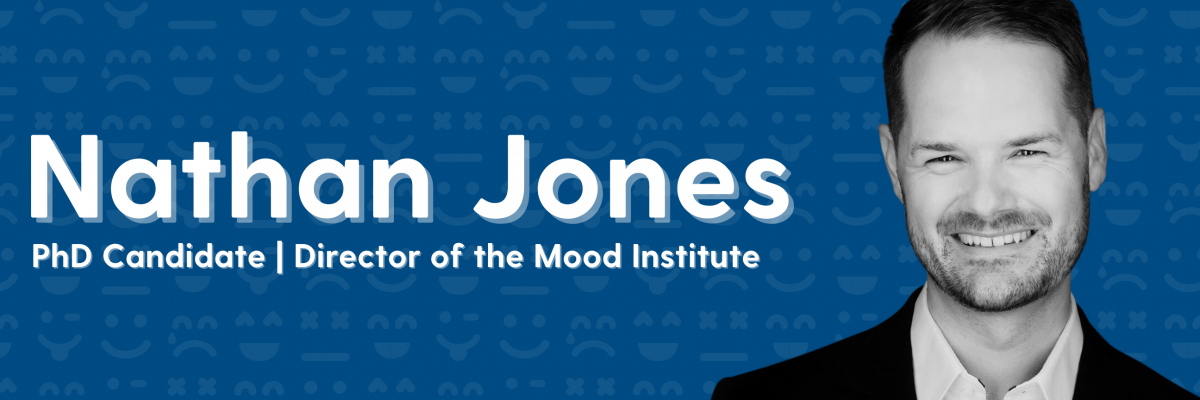Master Your Mood with a Mood Expert

You’re having a bad day. You missed your bus, it pours down with rain while you’re walking to Uni, and then you order a coffee and spill it on your shirt. Things are not going your way. What do you do now? How do you cope?
Well, we asked the University of Adelaide’s very own ‘mood expert’ this very question!
Nathan Jones is a PhD Candidate in the School of Psychology and the Director of the Mood Institute.
In our sit-down chat with Nathan, we discussed how to master your mood in stressful times (*cough cough* exams *cough cough*) and the role emotional intelligence plays in our career success post-university.
Listen in!
Our key takeaways from Nathan Jones:
3 things to do when you’re have a bad moment.
- Step 1: Stop. Just stop. And pause for a second.
- Step 2: Take a breath. A breath in. A breath out.
- Step 3: Observe. Observe what’s going on when you take that breath. Are you feeling anxiety or tightness? Can you name the emotion your feeling? Can you connect to where it is in your body that you’re feeling the tension.
This process stops us from having a ‘regrettable incident’ where we may do something that are not aligned with our values.
Also, labelling our emotions can be instant relief for us. It’s a way of making ourselves feel seen or heard. Validating your own emotions.
Connecting with your ‘little me’.
Sometimes being compassionate to yourself can be difficult.
One helpful tip to help develop your self-compassion and self-love is to imagine yourself as a child in difficult moments.
“If we’re looking at this bus situation, imagine it’s not a grown up me in this white shirt, but it’s a little me, in a little white t-shirt, stepping onto a school bus by myself on my first day of school. And I tip my fruit box over myself.
What would a loving parent do in that situation?
Would they say ‘What are you doing!! You messed up!’.
No, you’d say ‘Oh that’s okay! What can we do to make you feel better about this situation now? How can I be here for you? Maybe we can stop off to get something to clean it, or maybe we can stop by and get a new shirt for the day?’
How would a loving parent address that situation? And I think that self-compassion is so important when it comes to taking that next step when dealing with your identified emotion.”Nathan Jones
*BONUS TIP*: If you're a visual learner, make your lock screen a photo of yourself from when you were a kid. It’s a reminder of the little person that still lives in you and the care and compassion you should give that person.
Managing stress during exams
- Make sure you get enough sleep. (Cliché but true).
- Put your phone in the other room while you’re sleeping.
- Have a bedtime routine. Set an alarm for the evening to remind yourself it’s time to wind down.
- Joyful movement.
- What movement brings you joy? A morning dance? Walking to uni? A stroll with a friend?
- What movement brings you joy? A morning dance? Walking to uni? A stroll with a friend?
- Set the mood with your study space.
- Make your study space a place you want to be in.
- Clear your desk! Make some tea. Make it inviting!
Emotional intelligence in the workplace
- Emotional intelligence accounts for 57% of professional success.
- It’s repeatedly shown as one of the top 10 key competencies for the next decade.
- Emotional intelligence bleeds into all aspects of our life and our career:
- social and communication skills;
- empathy;
- self-awareness;
- an ability to self-regulate and
- being motivated to show up to work and meet KPIs.
- Emotional intelligence is the “engine room” of how we succeed at work.
Your emotions are data
“Emotions are data, and we just notice them coming up.
If I was to take the spreadsheet of all of my emotions that I feel and start deleting the ones I don’t like: I don’t like the stress I’m feeling when I study, I don’t like the anxiety, I don’t like the sadness, I don’t like the disappointment. All of these emotions actually belong, and soon as we start data picking, and taking out the ones we don’t like, we actually don’t have an accurate data set. And that’s not great academic practice, we want to be true to the data.
And so, if emotions are just data, we get to notice what comes up. So, over this exam period we get to say, ‘Oh hello, anxiety, hello nervousness.’ It all belongs. It’s what we do with those emotions that matters."Nathan Jones
